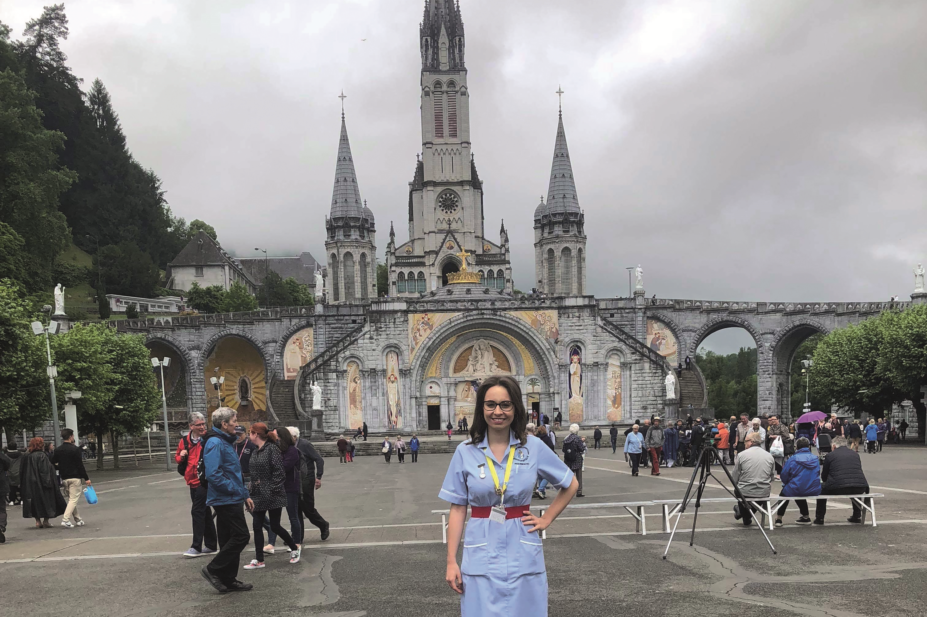
Courtesy of Charlotte Richardson
Charlotte Richardson describes her experience of volunteering as a newly qualified pharmacist as part of the annual Middlesbrough diocese pilgrimage to Lourdes.
In May 2018 I went to Lourdes, France, on pilgrimage with the Middlesbrough Roman Catholic diocese. Lourdes is a place of religious importance to Catholics with thousands making the journey every year. It is known for apparitions of Our Lady and for the water that flows from the spring there, which is thought to have healing properties. Every May a group of around 900 people from the diocese which geographically includes Middlesbrough, Hull and York make the journey by plane, rail and bus. This includes sick and elderly pilgrims, whom for many it is the highlight of the year and is an opportunity to take a holiday and have some respite. The group is made up of clergy, pilgrims, youth volunteers, and other volunteers. The volunteers include a clinical team of doctors, nurses and for the first time, myself as a pharmacist.
I have been to Lourdes twice before, once as a youth volunteer at school and once as a handmaid, a role which is similar to that of a healthcare assistant. After this, I promised myself I would go again once qualified and now I am already planning for next year.
While in Lourdes the pilgrims with significant requirements stay in a purpose-built hospital within the sanctuary of Our Lady of Lourdes known as the Accueil. For many, their first trip into the Accueil is one of amazement as it is an impressive resource with all that a hospital ward in England would have. The diocese hires the use of it for one week with everything except meals needing to be provided by the team of volunteers. The 50 or so pilgrims that stay at the Accueil range from those that are elderly and frail to those with spinal injuries, multiple sclerosis and Down’s syndrome. Some pilgrims have carers that stay with them but for the majority, their needs are met by the volunteers who work in shifts to ensure they are cared for.
Some pilgrims have significant health requirements but the team ensures that they are well-looked after and try to ensure they get the most out of Lourdes, whether this be attending mass and services or simply the chance to go out for a drink and socialise. I was lucky enough to accompany a young, 27-year-old quadriplegic pilgrim, along with a doctor on a trip to watch the Champions League football final. This was the highlight of the week for both of us. The whole trip was particularly significant for him as he had not been able to leave Middlesbrough in the seven years since his injury except for this trip to Lourdes. The team even took him to London to get a visa from the Nigerian embassy in preparation for the trip. The pilgrim suffers from autonomic dysreflexia and carries liquid filled nifedipine capsules for this. This is something the whole team had to be aware of and know how to administer if required.
Before making the journey to France, each pilgrim underwent a medical assessment which included medications, mobility and other requirements for the trip. Of the pilgrims in the Accueil, many who were more able, managed their own medications. For those with the highest needs, the clinical team took over this responsibility, similar to a hospital ward. For me this meant daily drug rounds, preparing and administering medications, answering queries from colleagues, and on one occasion trying to translate a box of French co-amoxiclav!
Prior to the trip I offered pharmaceutical advice and helped advise on care plans, particularly around medications. One pilgrim required a detailed medication care plan to be developed as he suffers from dysphagia and required certain medications to be crushed and dispersed.
The clinical team travel to Lourdes well prepared, with many supplies remaining in Lourdes in a lockup year round, but also taking supplies of dressings, gloves, sterile equipment and medications with them. The medications taken are common things that may be prescribed by one of our doctors while in France, such as antibiotics and laxatives. Other medications we get on a French prescription or buy.
Even for the flight home each pilgrim whose medications we manage require their doses be available for the flight. It was good we thought ahead as there was a two-hour delay.
The experience was brilliant from start to finish and allowed opportunities to work within a multidisciplinary team in a hospital-like setting, caring for inspiring people.
If you are interested in getting involved most Catholic dioceses run an annual pilgrimage to Lourdes and are normally desperate for volunteers, alternatively the Association Médicale Internationale de Lourdes accept volunteers from many health disciplines including pharmacy to help in a variety of roles.
About the author:
Charlotte L. Richardson is a newly qualified pharmacist who graduated from Keele University in 2016. She completed her pre-registration training at The James Cook University Hospital, Middlesbrough and is currently pursuing a Ph.D. with Keele University evaluating the use of virtual patients to teach pharmacist’s counselling skills for new oral anticoagulants. She locums in a community and hospital out-patient pharmacy and helps with clinical skills teaching at Newcastle University’s School of Pharmacy.


